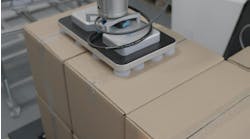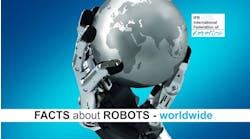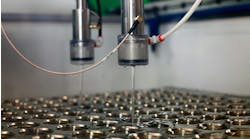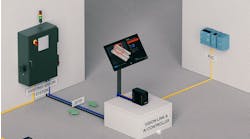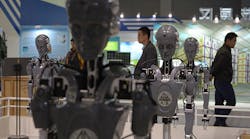Ever since robots emerged from the pages of science-fiction novels into the real world, humans have feared being usurped in the workplace.
That worry may be more fictional than scientific. A recent study by the VDMA Robotics and Automation Association shows that previous waves of automation have not made labor obsolete. In fact, in Germany, Europe’s largest user of robots, increased deployment of machine labor in the automotive sector has coincided with a rise in human employment.
The VDMA’s hypothesis is that uniquely human skills, such as knowledge, dexterity, and creativity, will increase in value as routine tasks are progressively automated. Rather than machines replacing human intervention, it argues, the future of work will be one of intelligence augmentation -- or computers amplifying human intellect and capabilities.
The idea rests on recent developments in technology. While robots have typically required a safety cage to keep them from harming the humans working around them, the world’s biggest robot makers -- Switzerland’s ABB Ltd., Japan’s Fanuc Corp. and Germany’s Kuka AG -- are building machines with new sensors that dramatically cut the risk of injury and help them better interact with workers.
"If you look back, employment hasn't fallen due to automation," according to Patrick Schwarzkopf, CEO of VDMA's robotics arm. "New approaches at smart factories actually look into using human strengths and the machine's strengths in an intelligent combination, so it doesn't look like we are running into a situation where we will massively lose jobs."
This might be comforting to those who worry about the labor effects of rising demand for industrial robots, such as the World Economic Forum. In January, the WEF estimated that over 5 million jobs will be lost globally due to technological change. Recently published figures from the International Federation of Robotics predict that annual global sales of industrial robots will almost double in volume by 2018.
Demand in this $32 billion-a-year market will be driven mainly by countries with low robot density. China is already the biggest and fastest growing robot market in the world, but its manufacturing industry only has a robot density of 36 units per 10,000 employees - just under half the global average of 66 units. China’s supply of robots is expected to increase more than 25% on average per year until 2018.
This doesn’t necessarily mean jobs for humans in China, or elsewhere, will shrink. Rather, we may be just a step closer to a reality where people and computers work side-by-side.
(Photo by ChinaFotoPress/ChinaFotoPress via Getty Images)

